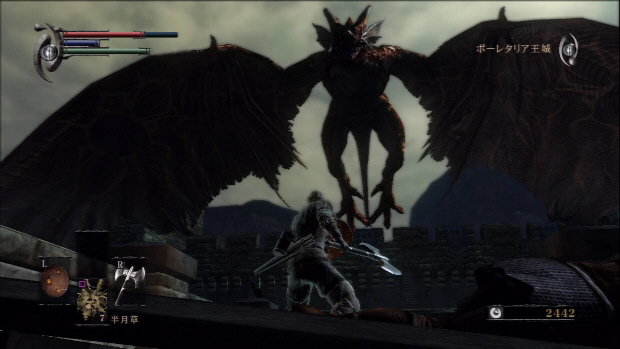There are hardcore music enthusiasts, bird watchers, book collectors and historians. For the majority of my conscious life I have strongly considered myself a "hardcore" gamer. "Hardcore" is a word that when combined with "gamer" is likely to produce involuntary sniggering and ignorance from a group of hardcore cunts. As the definition implies, I like to think myself commited and passionate enough to enjoy any videogame in some way. Just as a music enthusiast can appreciate the artistic endeavour of one man creating percussion on a block of cheese, I consider myself able to appreciate almost any form of videogame. Or at least that's what I thought, it turns out some are simply too hardcore for me.
From Software is an interesting development studio. They have developed a wealth of different IPs on a breadth of platforms, although they are most recognised for their work on two in particular, Kings Field and Armoured Core. Their latest IP however, the one that forced me to reconsider my place in the universe, is called Demon Souls. Just as hardcore Film enthusiasts would watch French New Wave films to prove their specialist knowledge, hardcore gamers have adopted Demon Souls as their poster child. And by all accounts Demon Souls too, like other adverts for hardcore movements is completely foreign. Drenched in Japanese design, Demon Souls is a linear action RPG like no other.
Most videogames treat death with a slap on the wrist. If you die in a conventional videogame, you witness a brief "You are dead" screen whilst the game reloads 5 minutes before you met your untimely end. The developer is basically chuckling like a patronising mother whilst proclaiming "Oooo aren't you clumsy". Demon Souls however is the pushy father who trains his son to play the piano 12 hours a day until he has mastered a particular song. He will not get it wrong, and if he does he will be punished. Every enemy in Demon Souls has the ability to kill you within single digits of seconds. If you do not have your shield at the ready and facing the direction your enemy is attacking from, you will die. And if you have spent the last hour trekking through the games depressing, melancholy dungeons only to be killed, you must start back from the levels beginning with all of the enemies you have defeated now out for revenge. And it gets worse. Each enemy you kill drops his soul for you to collect. These souls act as a necessary currency in order for you to buy, repair and upgrade your gear and stats. If you wish to collect all the souls you were holding once you died you must fight your way back to your body, where you must once again face the thing that killed you the first time. Should you die again your souls will be lost forever.

I mentioned earlier that Demon Souls is a game littered with Japanese design. This is true, however part of the reason for Demon Souls cult success is its amalgamation of other design cultures into the game. Most Japanese developers shudder at the words "online connectivity". From Software however simply grin. Demon Souls features online capabilities completely unique to the game, ones that consequently fit perfectly into the games ethos. Should you die, you may leave messages to other players about the events that caused your death in a bid to help other players survive. Alternatively you may gain a sadistic pleasure from providing false information that in the context of Demon Souls unforgiving design will no doubt kill whoever follows it. Not only that but Demon Souls will often throw an opposing player into your game world who is intent on killing you. These opposing players are players who have died and are looking to regain all their souls, interestingly should they kill you they will gain all their souls back instantly, causing a tense stand off in which one player desperately wants to avoid death whilst the other goes on the attack.
Demon Souls is unique. It is a game that challenges the player and doesn't accommodate for the lowest common denominator. It is a test of a gamer's skill, dexterity and patience. It pushes the player to get it right in a bid to hone their abilities, relying on muscle memory as much as quick thinking. Unfortunately Demon Souls isn't fun. It is tense, scary and more frustrating than a Manchester United replica shirt. For that reason I couldn't appreciate it like others could, perhaps I wasn't hardcore enough.






